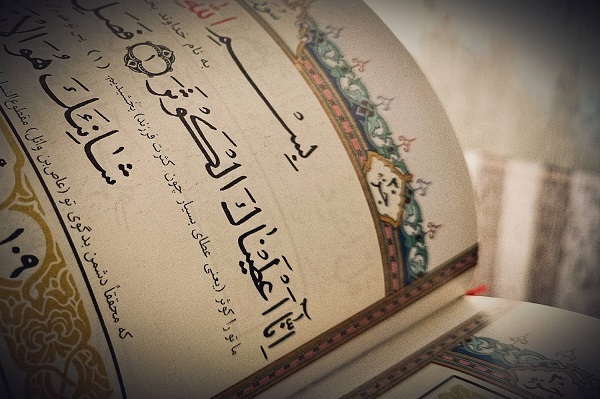Lady Fatimah Zahra (SA) in The Holy Quran

In fact, many verses had been revealed in the Holy Quran praising the Ahlul Bayt (AS), the holy family of the Prophet Mohammad (PBUH) including Lady Fatimah (SA).
On the occasion of the sad and untimely demise of Lady Fatimah, we are peeking into some of the verses and chapters of the Holy Quran where she was extolled.
Fatima (SA) in the verse of Purity
All the texts in the Islamic references agreed on the purity verse specialized for prophets Householders (AS).
Allah only wishes to remove uncleanness from you, O members of the (Prophet’s) household, and to purify you completely. [Surah Al-Ahzab 33:33]
In this verse householders are the Messenger of Allah Prophet Mohammad (PBUH), Ali (AS) the commander of faithful, Fatima (SA), Hassan (AS) and Hussein (AS).
Particularly, the greatest Prophet PBUH has announced them in the verse of purity by his speeches and actions. The prophet assembled them around him, then he covered them with Yemeni garment then he grabbed the ends of the garment so that no one gets confused and includes others in the verse of purity.
Fatima (SA) in the Mubahala verse
The Event of Mubahala was a debate between Prophet Mohammad and the Christians of Najran, who came to Medina claiming that Isa (Jesus) is divine and the son of Allah.
In fact, they meant to determine whether Prophet Mohammad’s claims were in accordance with the prophecies of their holy books. On this occasion, Mohammad (PBUH) is instructed by Quran to issue a challenge to the visiting Christians.
Mubahala means cursing in English, meaning that both sides of those who argue each other ask for a curse from Allah on the liar side.
Then whoever argues with you about it after [this] knowledge has come to you – say, “Come, let us call our sons and your sons, our women and your women, ourselves and yourselves, then supplicate earnestly [together] and invoke the curse of Allah upon the liars [among us].” [Surah Al-emran 3:61]
They agreed on a date for mubahalah or the challenge. When they returned to the place they were staying, their leaders al-Sayyid, al-‘Aqib and al-Ahtam said: If he challenged us with his people, we accept the challenge for he is not a prophet; but if he challenges us with his family in particular we do not challenge him, for he is not going to push forward his family unless he is truthful.
In the morning, they came to the Prophet Mohammad and with him Ali (AS), Fatimah (SA), Hassan (AS) and Hussein (AS), so the Christians said: Who are those? The people replied: This is his cousin and successor and son-in-law, and this is his daughter Fatimah, and these are his sons, Hassan and Hussein.
So they became frightened and said to the Messenger of Allah “We give you the satisfaction, so give us leave from the challenge.”
All Muslims have agreed that the Prophet (PBUH) took ‘Ali (AS) with him to represent “ourselves”, Hassan and Hussein (AS) to represent “Our Sons”, and Fatima (SA) to represent “Our Women”.
It is also a given fact that he did not accompany any other woman including his wives, his aunts, or, any other Muslim women.
This proves that there was not a woman as excellent, great, holy, and chaste as lady Fatima (SA). The Prophet called her alone to join him because she was the only woman capable of fulfilling the qualifications of the verse.
Surah Al-Kawthar, Abundant Goodness
Prophet Mohammad (PBUH) had two sons from his first wife Khadijah named Qasim and Tahir (who was also known as Abdullah) and both of them passed away in Mecca, and thus the Prophet did not have any sons.
The tragedy gave the Quraysh, the ruling tribe of Mecca at the time, the opportunity to hurl insults at the Prophet and refer to him as ‘abtar’ or one who has no (surviving) male children,
At that time, the Arabs gave a great deal of importance to male children and considered the son as being an extension of their father.
The revelation of Surah Al-Kawthar was a response to these individuals and let them know that: It is the enemies of the Prophet who will actually be ‘abtar’ or cut off in progeny, and that the message of Islam and the Quran will be carried on:
Indeed, we have granted you “O Prophet” abundant goodness. So, pray and sacrifice to your Lord alone. Only the one who hates you is truly cut off from any goodness. [Surah Al-Kawthar 108:1-3]
Some scholars have stated that “al-Kawthar” is a “Pool of Abundance” which belongs to the Prophet from where the believers will quench their thirst when they arrive in paradise.
Yet another interpretation is that it refers to the abundance of descendants all of who will come from the auspicious existence of Fatima Zahra, and will increase to such an extent that it will be impossible to count them.
Lady Fatimah was the holiest and purest woman in the history of Islam. Fatimah (SA) was one of the shining suns that undertook the mission of Allah and took on the values, principles and aims of Islam. She struggled for the sake of Allah and in the way of Islam until the last breath.
 Most Commented
Most Commented 


